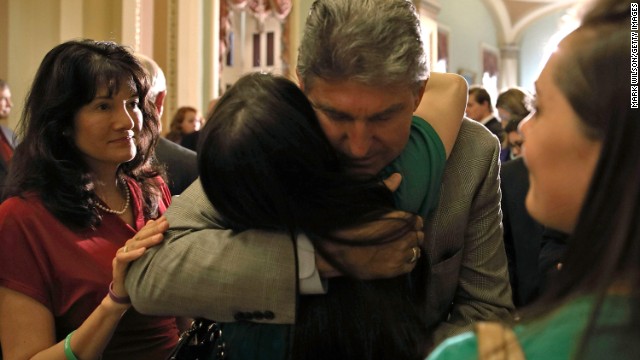Analysis: What happened the last time the Senate tried to pass gun control legislation - 4 minutes read

(CNN) Almost a decade ago, the US Senate -- in the wake of the mass school shooting in Newtown, Connecticut -- tried (and failed) to pass major gun control reform legislation.
Now, with a bipartisan group of senators again talking about gun control following a mass school shooting in Uvalde, Texas, it's worth re-examining what happened back in 2013 for clues as to whether the Senate might act (and how they might act) this time around.
Following the murder of 26 people -- including 20 children -- on December 14, 2012, then-President Barack Obama pledged to offer meaningful reforms on guns in America.
In each episode of his weekly YouTube show, Chris Cillizza will delve a little deeper into the surreal world of politics. Click to subscribe!
"This is our first task as a society: keeping our children safe," Obama said in unveiling a plan that included both executive actions and legislative proposals in January 2013. "This is how we will be judged, and their voices should compel us to change." He added of his proposals: "In the days ahead, I intend to use whatever weight this office holds to make them a reality."
Obama's push on guns was wide-reaching . His plan's most high-profile elements were a background check requirement for all gun sales, a reinstatement of the assault weapons ban that had lapsed in 2004, a limitation of ammunition magazines to 10 rounds and a ban on armor-piercing bullets.
It became clear relatively quickly that Obama's major legislative proposals were very unlikely to get the 60 votes it needed to break the Senate filibuster. A bipartisan compromise bill emerged, led by West Virginia Democratic Sen. Joe Manchin and Pennsylvania Republican Sen. Pat Toomey.
At the heart of that proposal was a requirement that guns purchased at gun shows and via the internet be subject to background checks. It also would have prohibited any individual listed in the National Instant Criminal Background Check System from purchasing a firearm. (Read this terrific PolitiFact breakdown to understand exactly what Manchin-Toomey would have done.)
* 54 yeas, including 50 Democrats and four Republicans. The Republicans who voted for the compromise were Maine Sen. Susan Collins, Illinois Sen. Mark Kirk, Arizona Sen. John McCain and Toomey.
* 46 nays, including 41 Republicans and five Democrats. The Democrats who voted against the compromise were Montana Sen. Max Baucus, Alaska Sen. Mark Begich, North Dakota Sen. Heidi Heitkamp, Arkansas Sen. Mark Pryor and Nevada Sen. Harry Reid. (Reid, the majority leader of the Senate at the time, voted against the measure to preserve his ability to bring it up again at a later date.)
Looking back, what can we learn about the chances for some sort of gun control measure passing the Senate following Uvalde?
Well, first and foremost, it depends on what is in the legislation -- which we don't know yet as the bipartisan talks have just started.
But it's clear that the Senate hasn't grown significantly more pro-gun control in the ensuing decade since Manchin-Toomey failed.
Of the five Democrats who voted against the measure, four have since been replaced by Republicans. (Reid's seat is now held by Democratic Sen. Catherine Cortez Masto, who faces a difficult reelection bid this fall.) Of that quartet of Senate Republicans -- Steve Daines of Montana, Dan Sullivan of Alaska, Kevin Cramer of North Dakota and Tom Cotton of Arkansas -- all have either an A+ or A rating from the National Rifle Association.
Of the four Republicans who voted for Manchin-Toomey in 2013, two -- Toomey and Collins -- remain in the Senate. The other two seats are now in Democratic control. McCain's seat is held by Democratic Sen. Mark Kelly, a longtime advocate for gun control, while Kirk's seat is held by Democratic Sen. Tammy Duckworth.
If anything, then, it might be marginally more difficult to get through a proposal like Manchin-Toomey in this current iteration of the Senate. And with Manchin opposed to changing the rules around the legislative filibuster, it seems unlikely anything that goes as far as Manchin-Toomey (or farther) will make it through this Senate.
Source: CNN
Powered by NewsAPI.org